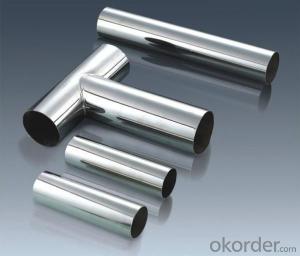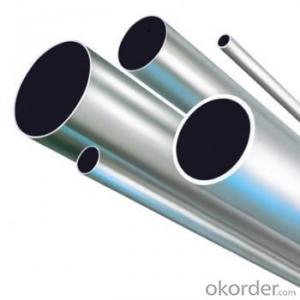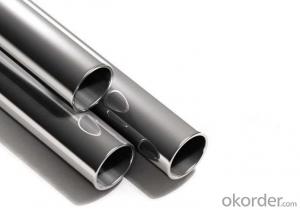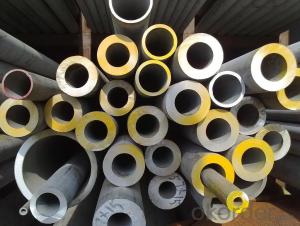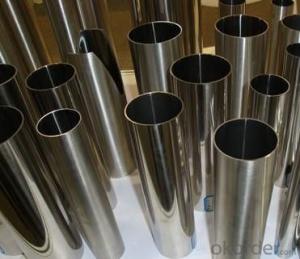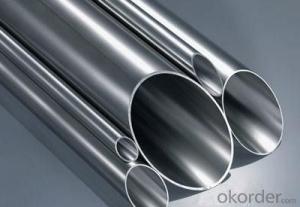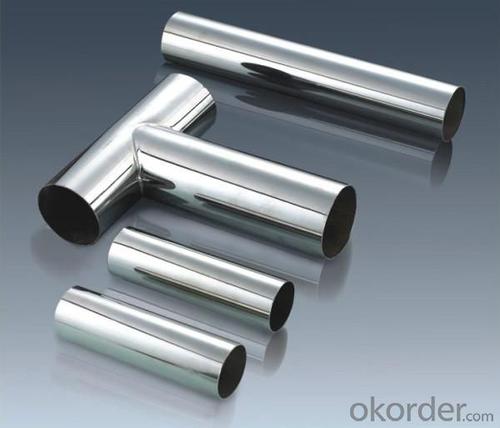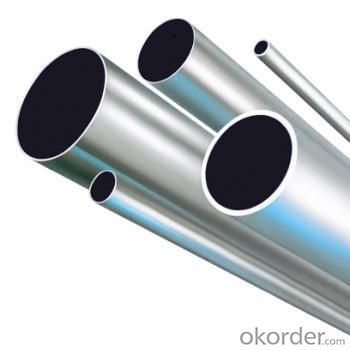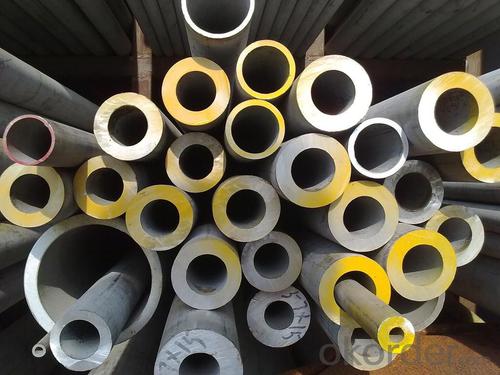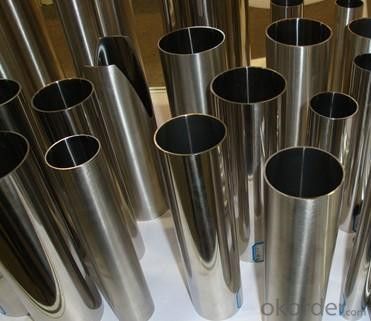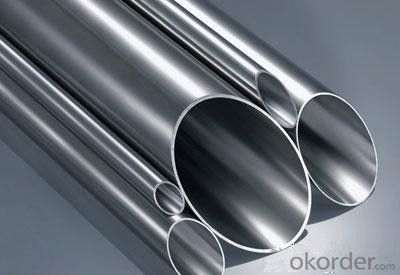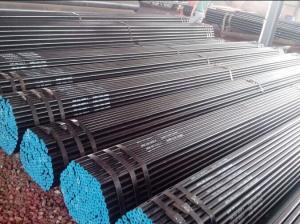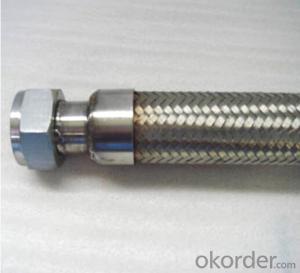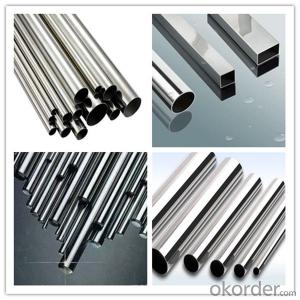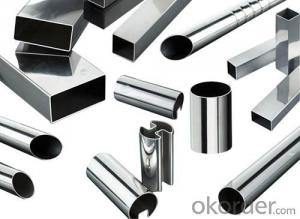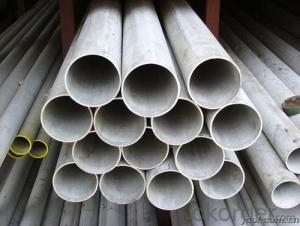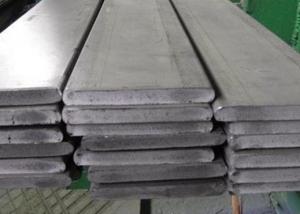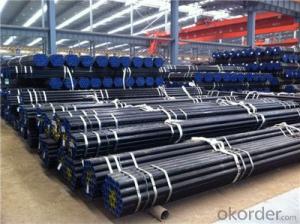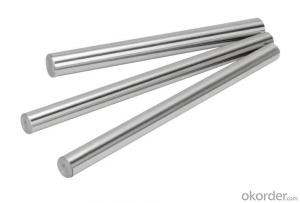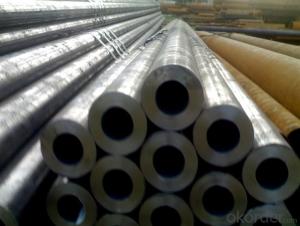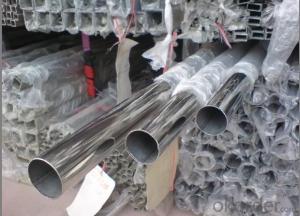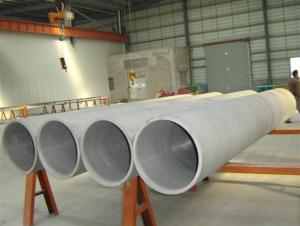304 Stainless Steel Pipe
- Loading Port:
- China main port
- Payment Terms:
- TT OR LC
- Min Order Qty:
- 5 m.t.
- Supply Capability:
- 100000 m.t./month
OKorder Service Pledge
OKorder Financial Service
You Might Also Like

304 stainless steel pipe price list
Our Advantages
You can get a competitive price with high quality.
We can provide sample for your evaluation.
We can provide Mill test certificate.
Your enquiry will get quickist and efficient response.
Introduction of grade 304
304 stainless steel material is a kind of common stainless steel materials, corrosion prevention is better than 200 series stainless steel materials. High resistance to high temperature is also better, it can reach to 1000-1200 degrees. 304 stainless steel has good corrosion,corrosion resistance and good resistance to intergranular corrosion. For oxidizing acid, obtained in the experiment, the concentration of 65% or less under the boiling temperature of nitric acid, 304 stainless steel has a strong corrosion resistance. To most organic and inorganic acid and alkali solution with good corrosion resistance ability.
Physical properties
Tensile strength σb (MPa): 520
Conditions yield strength 0.2 sigma (MPa) :205
Elongation δ5 (%) :40
Section shrinkage ψ (%): 60
Hardness: ≤187HB ≤90HRB≤200HV
Some details of our products
| Product: | 304 stainless steel pipe price list |
| Grade: | 304; sus304; 1.4301; |
| Standard: | ASTM,AISI,JIS,EN,DIN,GB |
| Surface treatment: | 8k, ba, hl |
| Thickness: | 0.4-30mm |
| Outer Diameter | 20-400mm |
| Productivity: | 900MT/Month |
| Products range | hot rolled stainless steel sheet, hot rolled stainless steel coil, hot rolled flat steel,cold rolled stainless steel sheet, cold rolled stainless steel coil, Industrial tube, decorative tube |
Trade terms
| Product | 304 stainless steel pipe price list |
| MOQ: | 5 Ton |
| Payment Term: | 1. 30%T/T in advance ,the balance against the B/L copy 2. 30%T/T in advance ,the balance against the L/C at sight 3. 100%L/C at sight |
| Price Term: | FOB/CFR/CIF |
| Delivery: | 1.10 days after receiving the deposit of T/T 2.10 days after receiving the L/C original |
| Packaging: | Standard Export Packing |
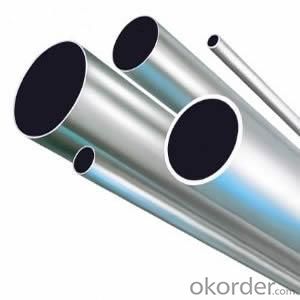
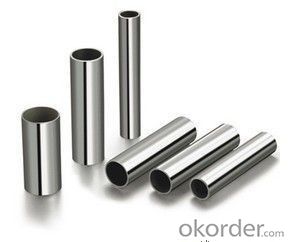
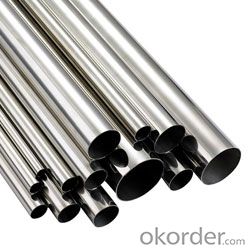
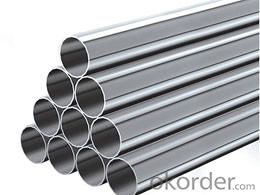
- Q: What are the weight limitations for stainless steel pipes?
- The weight limitations for stainless steel pipes can vary depending on various factors such as the diameter, wall thickness, and overall length of the pipe. It is best to consult the manufacturer or refer to industry standards and specifications to determine the specific weight limitations for a particular stainless steel pipe.
- Q: What are the common shapes of stainless steel pipes?
- Stainless steel pipes come in various shapes that are widely utilized across different industries. These shapes comprise of round pipes, square pipes, rectangular pipes, and oval pipes. Round pipes rank among the most prevalent shapes and find extensive use in diverse applications. They are primarily employed for fluid and gas transportation, as well as the conveyance of other materials. Furthermore, round pipes are well-suited for structural purposes like handrails, scaffolding, and support beams. Square pipes possess a square cross-section and are commonly employed in construction projects, architectural designs, and furniture manufacturing. They offer a sleek and contemporary appearance, often utilized for framing structures, manufacturing shelves, and creating decorative elements. Rectangular pipes possess a rectangular cross-section and are frequently utilized in the construction, engineering, and manufacturing industries. They are often employed in building frameworks, manufacturing gates, fences, and various structural components. Oval pipes possess an elliptical or oval shape and are used in applications where aesthetics play a significant role. They are a popular choice in architectural designs, the automotive industry, and decorative applications. In conclusion, the selection of stainless steel pipe shape depends on the specific requirements of the application and desired aesthetics. Each shape offers distinct advantages and is chosen based on factors such as strength, durability, ease of fabrication, and overall design requirements.
- Q: Are stainless steel pipes suitable for power generation plants?
- Power generation plants find stainless steel pipes to be a suitable option. Stainless steel is renowned for its exceptional resistance to corrosion, which makes it an ideal choice for power generation plants dealing with high temperatures, pressure, and corrosive surroundings. It is common for power generation plants to utilize different fluids like steam, water, and chemicals, which have the potential to cause corrosion and deterioration of the piping system. Stainless steel pipes can withstand such harsh conditions while ensuring long-lasting performance. Additionally, stainless steel pipes possess high strength and durability, which is crucial for power generation plants operating under high pressures. They can handle the stress and strain of the system without the risk of failure or leakage. Moreover, stainless steel exhibits resistance to scaling and fouling, which plays a significant role in maintaining the power plant's efficiency. The smooth inner surface of stainless steel pipes minimizes friction and pressure losses, guaranteeing the efficient flow of fluids. Furthermore, stainless steel pipes are easy to maintain and clean, eliminating the need for frequent inspections or repairs. This reduces downtime and maintenance costs for power generation plants. In conclusion, the remarkable corrosion resistance, strength, durability, and efficiency of stainless steel pipes make them highly suitable for power generation plants. They provide a dependable and long-lasting solution for fluid conveyance in demanding environments.
- Q: How do you calculate the flow rate of fluid through stainless steel pipes?
- To determine the flow rate of fluid through stainless steel pipes, one can utilize either the Bernoulli's equation or the Darcy-Weisbach equation. These equations incorporate several factors, including the pipe's diameter, length, fluid viscosity, and the pressure difference between both ends. 1. Bernoulli's equation, which hinges on the principle of energy conservation, establishes a relationship between pressure, velocity, and elevation along the fluid's path. The equation is as follows: P1 + 0.5 * ρ * V1^2 + ρ * g * h1 = P2 + 0.5 * ρ * V2^2 + ρ * g * h2 Here: - P1 and P2 denote the pressures at the pipe's two ends. - ρ represents the fluid's density. - V1 and V2 denote the fluid velocities at each end of the pipe. - g signifies the acceleration caused by gravity. - h1 and h2 refer to the fluid elevations at the respective ends. By rearranging the equation and solving for either V1 or V2, one can calculate the fluid's velocity. Multiplying this velocity by the pipe's cross-sectional area yields the flow rate. 2. The Darcy-Weisbach equation, widely employed to calculate pressure drop or head loss due to frictional resistance in a pipe, is expressed as follows: ΔP = f * (L / D) * (ρ * V^2 / 2) Here: - ΔP represents the pressure drop between the pipe's two ends. - f denotes the Darcy friction factor, which relies on the Reynolds number and pipe roughness. - L corresponds to the pipe's length. - D signifies the pipe's diameter. - ρ represents the fluid's density. - V denotes the fluid's velocity. By rearranging the equation and solving for V, one can compute the fluid's velocity. Multiplying this velocity by the pipe's cross-sectional area provides the flow rate. It is crucial to acknowledge that these equations offer theoretical calculations, and actual flow rates may deviate due to additional factors such as pipe roughness, fittings, and bends. Consequently, it is advisable to account for these factors, conduct experiments, or consult industry standards for more precise calculations.
- Q: How do stainless steel pipes compare to carbon steel pipes?
- Stainless steel pipes and carbon steel pipes are utilized extensively in various industries and applications, but they differ in composition, strength, durability, and corrosion resistance. One main distinction between stainless steel pipes and carbon steel pipes is their composition. Stainless steel pipes are produced from an iron alloy containing a minimum of 10.5% chromium, which ensures exceptional corrosion resistance. Conversely, carbon steel pipes are primarily composed of iron and carbon, with smaller quantities of other elements. In terms of strength, carbon steel pipes generally exhibit greater rigidity and strength compared to stainless steel pipes. This characteristic renders carbon steel pipes suitable for applications necessitating high pressure or heavy load-bearing capacity. Stainless steel pipes, though not as strong as carbon steel pipes, still possess commendable strength and are suitable for various applications where corrosion resistance is a priority. When it comes to corrosion resistance, stainless steel pipes outperform carbon steel pipes. The presence of chromium in stainless steel forms a protective layer, referred to as the passive film, on the surface, which prevents corrosion and rusting. This makes stainless steel pipes ideal for use in corrosive environments, such as chemical processing, marine, and offshore industries. On the other hand, carbon steel pipes are more susceptible to corrosion and require additional protective coatings or treatments to enhance their resistance. Durability is another crucial factor to consider when comparing stainless steel pipes to carbon steel pipes. Stainless steel pipes are renowned for their long lifespan and resistance to wear and tear, making them a cost-effective option in the long term. Carbon steel pipes, while durable, may necessitate more maintenance and regular inspections to prevent corrosion and degradation. To conclude, stainless steel pipes offer superior corrosion resistance, making them more suitable for use in corrosive environments. On the other hand, carbon steel pipes are stronger and more rigid, making them suitable for applications requiring high pressure. The choice between stainless steel and carbon steel pipes ultimately depends on the specific requirements of the application, including the desired level of corrosion resistance, strength, and durability.
- Q: What is the cost difference between stainless steel pipes and other materials?
- The price discrepancy between stainless steel pipes and alternative materials can fluctuate depending on a variety of factors, including the type of material being compared, the size and specifications of the pipes, and the current state of the market. Generally speaking, stainless steel pipes often carry a higher price tag than materials like PVC, copper, or galvanized steel. This is mainly due to the elevated costs of production and raw materials associated with stainless steel, as well as its superior characteristics and durability. Stainless steel pipes boast numerous advantages over other materials, such as exceptional resistance to corrosion, impressive strength, and the ability to endure extreme temperatures. These qualities render stainless steel pipes particularly well-suited for a wide range of applications, particularly within industries like oil and gas, chemical processing, and water treatment. While stainless steel pipes may entail a greater initial expense, they often yield long-term cost savings due to their extended lifespan and reduced maintenance needs. Moreover, the higher upfront investment in stainless steel pipes can be justified by considering the potential costs linked to pipe failures, leaks, or replacements that may arise with other materials. It is crucial to bear in mind that the cost disparity between stainless steel pipes and alternative materials can vary significantly depending on the specific requirements of a project and the prevailing market conditions. Consequently, it is advisable to consult suppliers, contractors, or industry experts to obtain precise and up-to-date pricing information tailored to a particular application.
- Q: Can stainless steel pipes be used for oil and gas refineries?
- Yes, stainless steel pipes can be used for oil and gas refineries. Stainless steel offers excellent corrosion resistance, high strength, and durability, making it suitable for handling various corrosive fluids and gases in the refining process. Additionally, stainless steel pipes can withstand high temperatures and pressures, ensuring the safe and efficient transportation of oil and gas in refineries.
- Q: What is the difference between Type 304 and Type 316 stainless steel pipes?
- Type 304 and Type 316 stainless steel pipes find wide application in diverse industries, each possessing distinct composition and physical characteristics. Type 304 stainless steel, a versatile and commonly utilized grade of stainless steel pipe, boasts a higher proportion of chromium and nickel compared to Type 316. Consequently, it exhibits exceptional resistance to corrosion and durability. Type 304 proves ideal for situations where exposure to corrosive substances remains minimal, such as indoor settings or general-purpose utilization. In contrast, Type 316 stainless steel pipes are renowned for their superior corrosion resistance, particularly in more hostile environments. They contain a higher proportion of molybdenum, which bolsters their ability to withstand pitting and crevice corrosion caused by chloride solutions, like seawater or saltwater environments. This renders Type 316 stainless steel pipes suitable for marine applications, chemical processing plants, and situations where exposure to harsh chemicals or high temperatures is inevitable. Regarding physical properties, Type 316 stainless steel pipes exhibit greater tensile strength and yield strength when compared to Type 304. Consequently, they can endure higher pressures and display enhanced resistance against deformation or cracking under stress. In summary, the primary distinction between Type 304 and Type 316 stainless steel pipes lies in their corrosion resistance and physical properties. Type 304 proves suitable for general-purpose use and indoor environments, while Type 316 is preferred for applications necessitating superior corrosion resistance and strength, particularly in aggressive or high-temperature conditions.
- Q: What is the difference between Sch 40 and Sch 80 stainless steel pipes?
- Sch 40 and Sch 80 stainless steel pipes differ in their wall thicknesses. Sch 40 denotes a pipe with a "Schedule 40" wall thickness, while Sch 80 refers to a pipe with a "Schedule 80" wall thickness. The schedule number signifies the approximate wall thickness of the pipe, with higher numbers indicating thicker walls. When it comes to stainless steel pipes, Sch 80 has a greater wall thickness compared to Sch 40. The variation in wall thickness leads to disparities in pressure rating and strength. Sch 80 stainless steel pipes are engineered to withstand higher pressure and are generally employed in applications where the pipe must endure heightened levels of stress or extreme conditions. Conversely, Sch 40 stainless steel pipes are typically used in less demanding situations where lower pressure ratings are acceptable. Furthermore, the increased wall thickness of Sch 80 pipes results in a smaller internal diameter in contrast to Sch 40 pipes. This reduction in internal diameter can affect the flow rate of fluids or gases through the pipe, so it is crucial to take this factor into account when selecting the appropriate pipe for a specific application. To summarize, the primary distinction between Sch 40 and Sch 80 stainless steel pipes lies in their wall thickness. Sch 80 pipes are thicker and capable of handling higher pressure and stress levels.
- Q: How do stainless steel pipes compare to copper nickel pipes?
- Various industries commonly utilize stainless steel pipes and copper nickel pipes due to their unique properties and advantages. Although their purposes are similar, there are notable distinctions between the two. To begin, stainless steel pipes consist of an alloy primarily composed of iron, with substantial amounts of chromium and other elements. They exhibit exceptional resistance to corrosion, making them suitable for applications that prioritize durability and longevity. Additionally, stainless steel pipes possess considerable strength, rendering them ideal for high-pressure environments. Furthermore, they can withstand extreme temperatures, making them suitable for a wide array of applications. On the other hand, copper nickel pipes are comprised of an alloy that combines varying proportions of copper and nickel. These pipes possess high resistance to corrosion, particularly in seawater environments, which makes them highly useful in marine applications. Furthermore, copper nickel pipes exhibit excellent thermal conductivity and resist biofouling, making them suitable for heat exchangers and condensers in diverse industries. Regarding cost, stainless steel pipes generally offer a more affordable option compared to copper nickel pipes. The price difference can significantly impact decisions involving large-scale installations or projects with budget constraints. Furthermore, the selection between stainless steel and copper nickel pipes depends on specific requirements and conditions. For instance, if corrosion resistance is the primary concern, copper nickel pipes would be the preferred choice, especially in marine environments. Conversely, if strength, durability, and versatility are paramount, stainless steel pipes would be the superior option. In conclusion, stainless steel pipes and copper nickel pipes each possess distinct advantages and applications. Both materials are excellent choices for various industries, but the ultimate decision relies on factors such as corrosion resistance, strength, thermal conductivity, and budget considerations.
Send your message to us
304 Stainless Steel Pipe
- Loading Port:
- China main port
- Payment Terms:
- TT OR LC
- Min Order Qty:
- 5 m.t.
- Supply Capability:
- 100000 m.t./month
OKorder Service Pledge
OKorder Financial Service
Similar products
Hot products
Hot Searches
Related keywords
